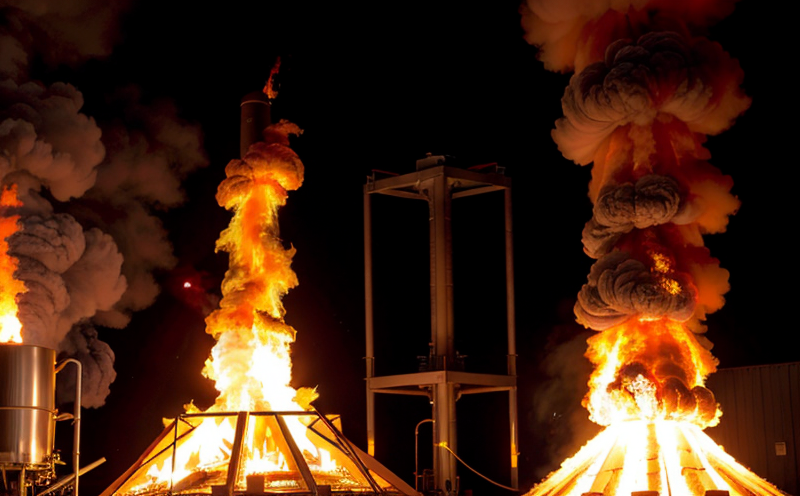BS 476 Flammability Testing of Building Materials
The British Standard BS 476 series is widely recognized and applied in the construction industry for evaluating the fire resistance, flammability, and structural integrity of building materials. Specifically, BS 476-1 is concerned with the determination of the minimum ignition temperature (MIT) which is a critical parameter when assessing the risk of spontaneous combustion or flaming of materials under certain conditions.
The standard plays a pivotal role in ensuring that construction products meet stringent safety requirements to prevent fire-related incidents. The tests conducted according to this standard are essential for manufacturers, architects, and engineers who need to demonstrate compliance with regulatory standards before marketing their products into the European market or UK.
Flammability testing of building materials is a complex process that involves multiple parameters including material composition, physical properties, and environmental conditions. A thorough understanding of these factors is necessary for accurate test results. Our laboratory adheres strictly to the procedures outlined in BS 476-1, ensuring reliable and reproducible data.
The testing procedure typically begins with proper preparation of specimens which should be cut into standard sizes and shapes as per the specified dimensions provided by the standard. Properly prepared samples are then subjected to controlled environmental conditions before being exposed to heat sources.
During the test, it is crucial to monitor various parameters such as surface temperature rise, smoke production, and flame behavior over time. These measurements help determine whether a material meets the required criteria for flammability. Results from these tests are used by manufacturers to improve product design and safety features while also aiding in regulatory compliance.
Our laboratory utilizes state-of-the-art equipment including convection ovens, calorimeters, and other specialized instruments designed specifically for conducting BS 476-1 tests. This ensures accurate measurements throughout the testing process from initial sample preparation through final evaluation of test results.
The outcome of the test is reported in accordance with the requirements stipulated by the standard. The report includes detailed descriptions of both successful and failed specimens, along with any deviations observed during the course of the experiment. Compliance with BS 476-1 provides assurance that construction materials are safe to use in various applications where fire resistance or flammability is a concern.
In addition to providing accurate test results, our laboratory also offers comprehensive technical support throughout the entire testing process including consultation on appropriate specimen preparation techniques and interpretation of results. This level of service ensures clients receive reliable information they can trust when making decisions about their projects."
Applied Standards
| Standard Code | Description |
|---|---|
| BS 476-1:2005 | Determination of the minimum ignition temperature (MIT) |
| ISO 834:1995 | Standard conditions for flame spread and thermogravimetric analysis |
The BS 476-1 standard specifies the method used to determine the minimum ignition temperature (MIT) of a material. This test involves exposing samples to controlled heating until they reach their MIT, which is defined as the lowest temperature at which self-sustained combustion occurs when exposed to a flame source.
ISO 834 provides additional guidance on standard conditions for conducting flammability tests such as temperature control and ventilation rates. These international standards ensure that all laboratories performing similar tests follow consistent procedures, thereby facilitating comparability of results across different institutions."
Quality and Reliability Assurance
- Regular calibration of equipment to maintain accuracy.
- Detailed documentation of all test procedures and results.
- Ongoing training for staff on the latest testing techniques.
- Use of high-quality, standardized materials for calibrating instruments.
We take pride in maintaining the highest standards of quality and reliability in our flammability testing services. Our laboratory adheres strictly to all relevant regulations and guidelines set forth by recognized bodies such as British Standards Institution (BSI), International Organization for Standardization (ISO), American Society for Testing Materials (ASTM) and European Committee for Standardization (CEN).
Our commitment to excellence is reflected in our robust quality management systems, which include regular internal audits, external reviews by independent assessors, and continuous improvement initiatives aimed at enhancing the accuracy and precision of our testing capabilities.
Customer Impact and Satisfaction
Our customers rely on us to provide accurate, reliable flammability test results that meet or exceed all relevant regulatory requirements. By offering comprehensive support services from initial consultation through final report delivery, we help our clients navigate the complexities of complying with international standards.
We understand that time is often of the essence for many projects, so we strive to deliver quick turnaround times without compromising on quality. Our experienced technical team works closely with each customer to ensure they receive timely feedback and actionable insights from their tests.





